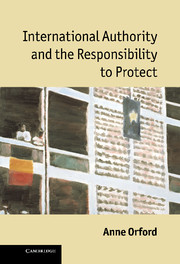Book contents
- Frontmatter
- Contents
- Acknowledgements
- 1 Protection in the Shadow of Empire
- 2 Practices of Protection: From the Parliament of Man to International Executive Rule
- 3 How to Recognise Lawful Authority: Hobbes, Schmitt and the Responsibility to Protect
- 4 Who Decides? Who Interprets?: Jurisdiction, Recognition and the Institutionalisation of Protection
- 5 The Question of Status and the Subject of Protection
- Bibliography
- Index
5 - The Question of Status and the Subject of Protection
Published online by Cambridge University Press: 04 February 2011
- Frontmatter
- Contents
- Acknowledgements
- 1 Protection in the Shadow of Empire
- 2 Practices of Protection: From the Parliament of Man to International Executive Rule
- 3 How to Recognise Lawful Authority: Hobbes, Schmitt and the Responsibility to Protect
- 4 Who Decides? Who Interprets?: Jurisdiction, Recognition and the Institutionalisation of Protection
- 5 The Question of Status and the Subject of Protection
- Bibliography
- Index
Summary
This book has argued that the responsibility to protect concept offers a normative foundation for the practices of international executive action that have been undertaken in the decolonised world since the late 1950s. Those practices were introduced by Dag Hammarskjöld during his tenure as Secretary-General to fill the ‘power vacuums’ caused by the liquidation of the colonial system, and have since expanded to create a long-term policing and managerial role for the UN in the decolonised world. The project of implementing the responsibility to protect concept at the UN is an attempt to consolidate the pre-existing but dispersed practices of executive rule into an integrated system. This concluding chapter explores the political implications of the emergence and embrace of the responsibility to protect concept. What might it mean for international officials to describe their authority to rule in the decolonised world as the exercise of a responsibility to protect? What might it mean for the UN to consolidate, integrate and intensify the forms of executive action it has developed to maintain peace in the decolonised world? Does the responsibility to protect concept help to make the practices of international executive rule intelligible in ways that are politically useful?
The crisis of parliamentary democracy in international relations
In one of his very last speeches, Dag Hammarskjöld explained why international executive rule was an important advance over what he termed a ‘conference’ or parliamentary-based conception of internationalism.
[O]ne of the essential points on which these experiments in international cooperation represent an advance beyond traditional ‘conference diplomacy’ is the introduction on the international arena of joint permanent organs, employing a neutral civil service, and the use of such organs for executive purposes on behalf of all the members of the organizations. […]
- Type
- Chapter
- Information
- International Authority and the Responsibility to Protect , pp. 189 - 212Publisher: Cambridge University PressPrint publication year: 2011



